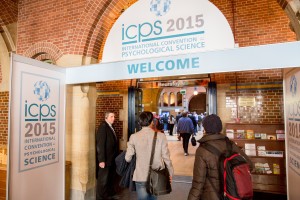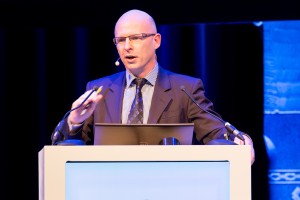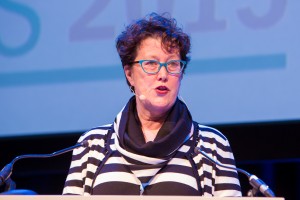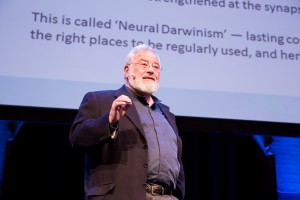Cross-cutting Keynotes Highlight ICPS
 Nearly 2,200 scientists and students from around the world converged in the city of Amsterdam recently for the inaugural International Convention of Psychological Science (ICPS), the culmination of efforts by the Association for Psychological Science, partnering European psychological science societies, and an international network of organizations and individual scientists to stimulate scientific advances that cut across geographic and disciplinary boundaries. The 12-14 March 2015 event featured presentations from a variety of world’s leading researchers in the field of psychology, anthropology, neuroscience, sociology, education, communications and more.
Nearly 2,200 scientists and students from around the world converged in the city of Amsterdam recently for the inaugural International Convention of Psychological Science (ICPS), the culmination of efforts by the Association for Psychological Science, partnering European psychological science societies, and an international network of organizations and individual scientists to stimulate scientific advances that cut across geographic and disciplinary boundaries. The 12-14 March 2015 event featured presentations from a variety of world’s leading researchers in the field of psychology, anthropology, neuroscience, sociology, education, communications and more.
 Keynote speakers reflected the breadth of the science covered at this seminal convention. Psychological scientist Stanislas Dehaene (College de France and INSERM-CEA Cognitive Neuroimaging Unit) discussed how science is tearing apart the series of distinct operations that occur in the brain as a person processes information. By combining pattern classifying programs with existing neuroimaging technologies like MEG and EEG, scientists can determine when information becomes explicitly represented in brain activity, Dehaene said. These tools have allowed researchers to clarify the time course of several classical psychological phenomena, including masking, attentional blink, and the psychological refractory period. According to Dehaene, these new methods can help to reveal the boundary between conscious and unconscious states of processing, and may even be applied to determining consciousness in coma patients.
Keynote speakers reflected the breadth of the science covered at this seminal convention. Psychological scientist Stanislas Dehaene (College de France and INSERM-CEA Cognitive Neuroimaging Unit) discussed how science is tearing apart the series of distinct operations that occur in the brain as a person processes information. By combining pattern classifying programs with existing neuroimaging technologies like MEG and EEG, scientists can determine when information becomes explicitly represented in brain activity, Dehaene said. These tools have allowed researchers to clarify the time course of several classical psychological phenomena, including masking, attentional blink, and the psychological refractory period. According to Dehaene, these new methods can help to reveal the boundary between conscious and unconscious states of processing, and may even be applied to determining consciousness in coma patients.
 Duke University psychological scientist Terrie E. Moffitt provided dramatic details of her own work studying self-control. Moffitt, known for her collaborations across a variety of disciplines, talked about longitudinal data that she and her colleagues have accumulated from cohorts in both New Zealand and the United Kingdom. In following a cohort of individuals from birth to their late 30s, Moffitt and her colleagues found that children who scored low on a variety of self-control measures at age 3 were more likely as adults to have criminal records, addictions, welfare dependency, low financial savings, bad credit ratings, and health problems compared with those who scored high on self-control as toddlers. In another study of 500 UK twins, the sibling with better self-control at age 5 had better life outcomes than the twin sibling with weak self-control. These results held across socio-economic status, IQ, and other variables.
Duke University psychological scientist Terrie E. Moffitt provided dramatic details of her own work studying self-control. Moffitt, known for her collaborations across a variety of disciplines, talked about longitudinal data that she and her colleagues have accumulated from cohorts in both New Zealand and the United Kingdom. In following a cohort of individuals from birth to their late 30s, Moffitt and her colleagues found that children who scored low on a variety of self-control measures at age 3 were more likely as adults to have criminal records, addictions, welfare dependency, low financial savings, bad credit ratings, and health problems compared with those who scored high on self-control as toddlers. In another study of 500 UK twins, the sibling with better self-control at age 5 had better life outcomes than the twin sibling with weak self-control. These results held across socio-economic status, IQ, and other variables.
 In a final keynote address, world-renowned cognitive linguist George Lakoff (University of California, Berkeley) delivered a comprehensive talk about the nature of embodied structures in the brain, the use of metaphor in various contexts, and the application of cognitive and neural linguistics to politics, literature, psychology, philosophy, and mathematics. Also featured at the event were a series of integrative science symposia covering such topics as:
In a final keynote address, world-renowned cognitive linguist George Lakoff (University of California, Berkeley) delivered a comprehensive talk about the nature of embodied structures in the brain, the use of metaphor in various contexts, and the application of cognitive and neural linguistics to politics, literature, psychology, philosophy, and mathematics. Also featured at the event were a series of integrative science symposia covering such topics as:
• psychology in an economic world;
• the transfer of psychopathology from one generation to the next;
• society, culture, and meaning systems;
• attention and the conscious mind;
• lifespan development and executive control;
• intensive longitudinal data and dynamical systems;
• online relationships;
• origins and functions of spirituality;
• non-verbal communication; and
• assessment of psychological change.
An extensive ICPS photo album of the event can be found on the APS Facebook page. Look for detailed ICPS coverage in the May-June issue of the Observer, and for video recordings of the key presentations coming soon to the APS website.





Comments
Many thanks for the organization this epochal event!
I am an Ethiopian,a Psychologist(BA/MA)& an Independent Management Consultant, having morethan 18 years of work experiences and professional achievement at non-profit (NGOs), Private Institution, acadamics and consultancy industry across the various regions in Ethiopia! I have a substancial experiences in the application of psychological knowledge for the societal/community transformation, poverty reduction and development works! In so doing, i have a direct working exposure with the hard to reach, unprivillaged and disadvantaged people : orphans & vulnerable children, children with disability, refugee& displaced children/ youth, women who are mariginalized &victims of violance…! The ICPS 2017: International event is very fundamental to fellow professionals in Africa to build one’s capacity with scientific advances, share new ideas, insights and establish synergy with like minded participents! I would appreciate if you give me the chance to participate at this special event! Thank you
APS regularly opens certain online articles for discussion on our website. Effective February 2021, you must be a logged-in APS member to post comments. By posting a comment, you agree to our Community Guidelines and the display of your profile information, including your name and affiliation. Any opinions, findings, conclusions, or recommendations present in article comments are those of the writers and do not necessarily reflect the views of APS or the article’s author. For more information, please see our Community Guidelines.
Please login with your APS account to comment.